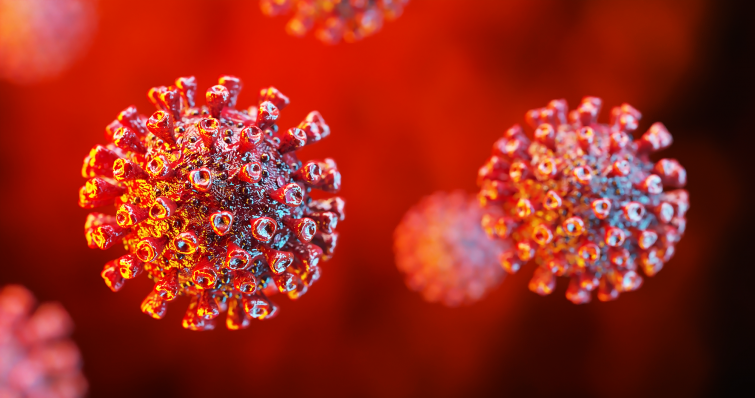
 CORONAVIRUS
CORONAVIRUS
Report on the general staff meeting and discussion session about SARS-CoV-2 and COVID-19 on March 15
On Monday March 15, a general staff meeting and discussion session was held on the subject of SARS-CoV-2 and COVID-19. This was an opportunity to look at the dynamics of the epidemic, the dynamics of the Institut Pasteur's research and COVID-19 vaccination at the Institut Pasteur. More than 850 of you attended the meeting.
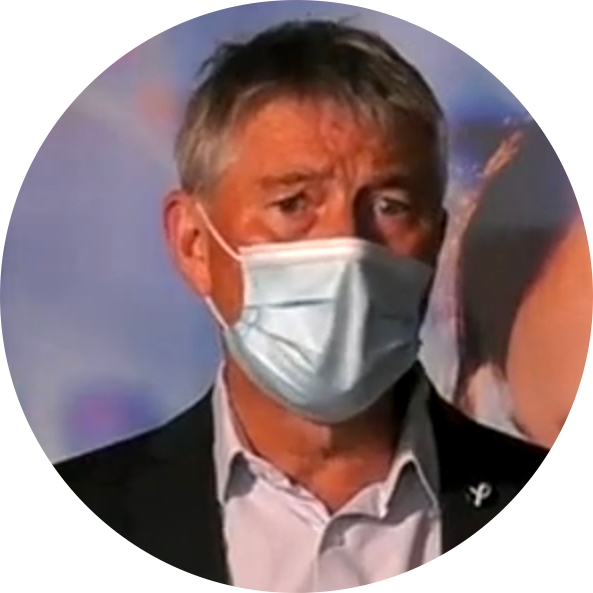 As Stewart Cole, President of the Institut Pasteur, explained in his introduction, given that the virus is still circulating and the situation remains particularly complex, "the main aim of the meeting was to give as comprehensive an overview of the situation as possible." Several short explanatory presentations followed, drawing on the expertise of the entire Institut Pasteur community to provide staff with detailed information and a broad understanding of the current situation.
As Stewart Cole, President of the Institut Pasteur, explained in his introduction, given that the virus is still circulating and the situation remains particularly complex, "the main aim of the meeting was to give as comprehensive an overview of the situation as possible." Several short explanatory presentations followed, drawing on the expertise of the entire Institut Pasteur community to provide staff with detailed information and a broad understanding of the current situation.
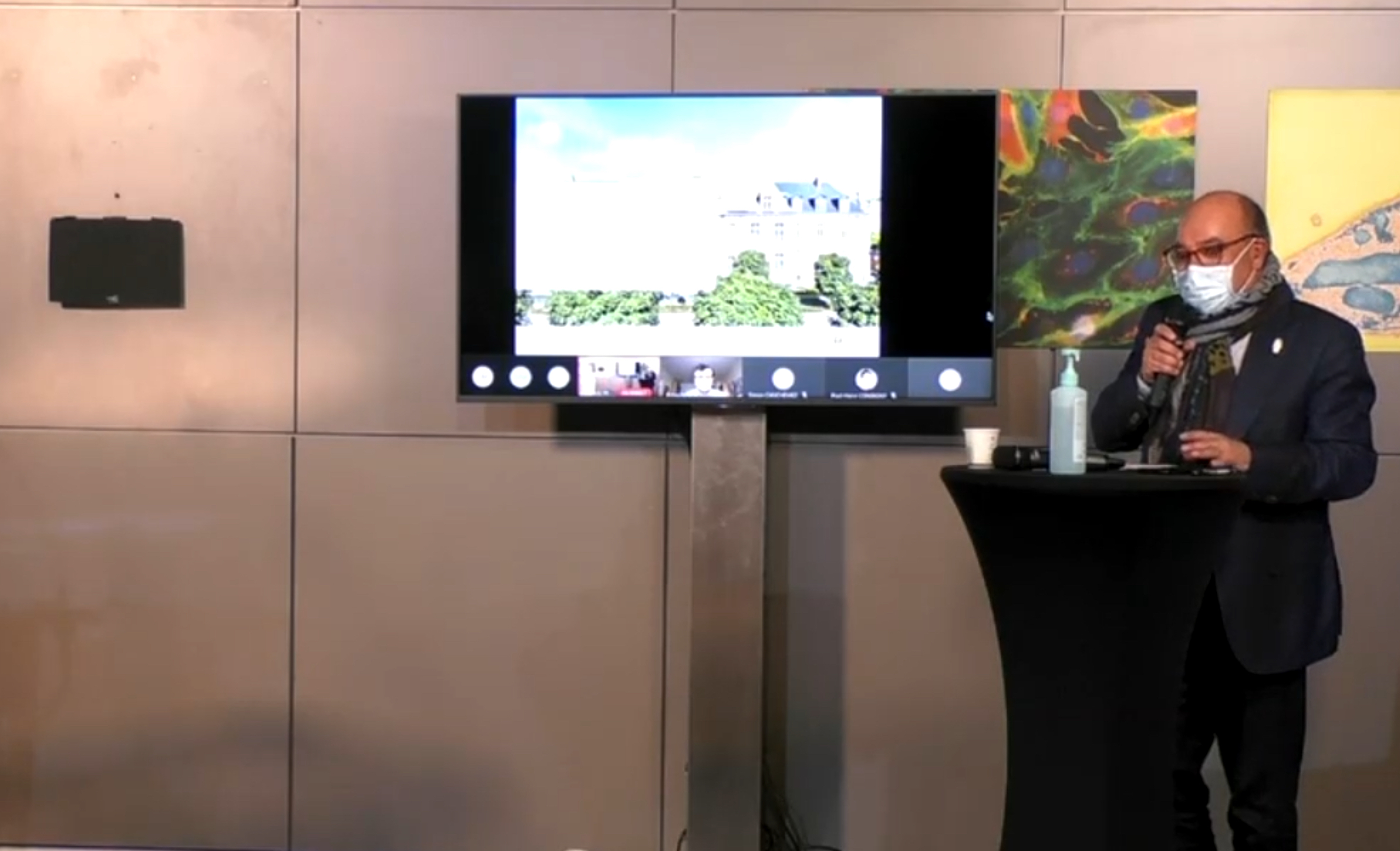
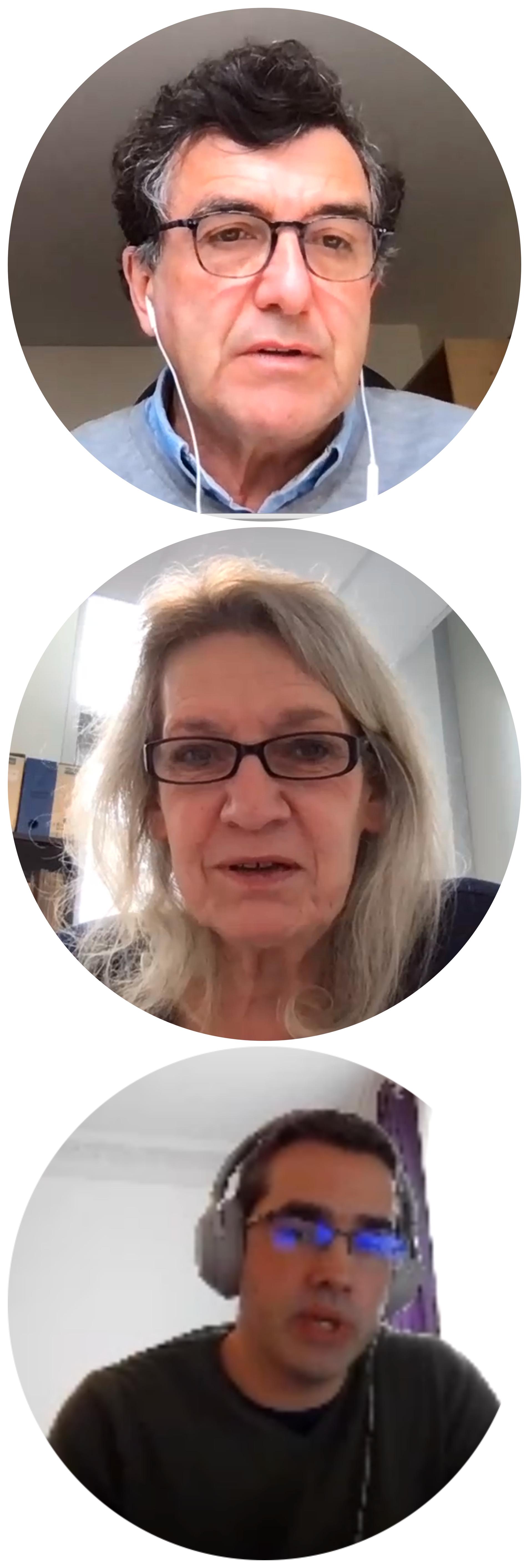 The first part, moderated by Jean-François Chambon, Vice-President Communications and Fundraising, looked at the dynamics of the epidemic. Arnaud Fontanet began by offering a snapshot of the determinants of the epidemic over the past year and the impact of vaccination. Sylvie van der Werf then spoke about variants and the introduction of a national surveillance strategy that has enabled the country to take the measure of the challenges raised by the current variants of interest and any future variants that may emerge. Finally, Simon Cauchemez explained how mathematical modeling can be used to help understand the decisive factors in the race between variants and vaccines. He also presented the Institut Pasteur's COVID-19 modeling site, which has recently been launched online.
The first part, moderated by Jean-François Chambon, Vice-President Communications and Fundraising, looked at the dynamics of the epidemic. Arnaud Fontanet began by offering a snapshot of the determinants of the epidemic over the past year and the impact of vaccination. Sylvie van der Werf then spoke about variants and the introduction of a national surveillance strategy that has enabled the country to take the measure of the challenges raised by the current variants of interest and any future variants that may emerge. Finally, Simon Cauchemez explained how mathematical modeling can be used to help understand the decisive factors in the race between variants and vaccines. He also presented the Institut Pasteur's COVID-19 modeling site, which has recently been launched online.

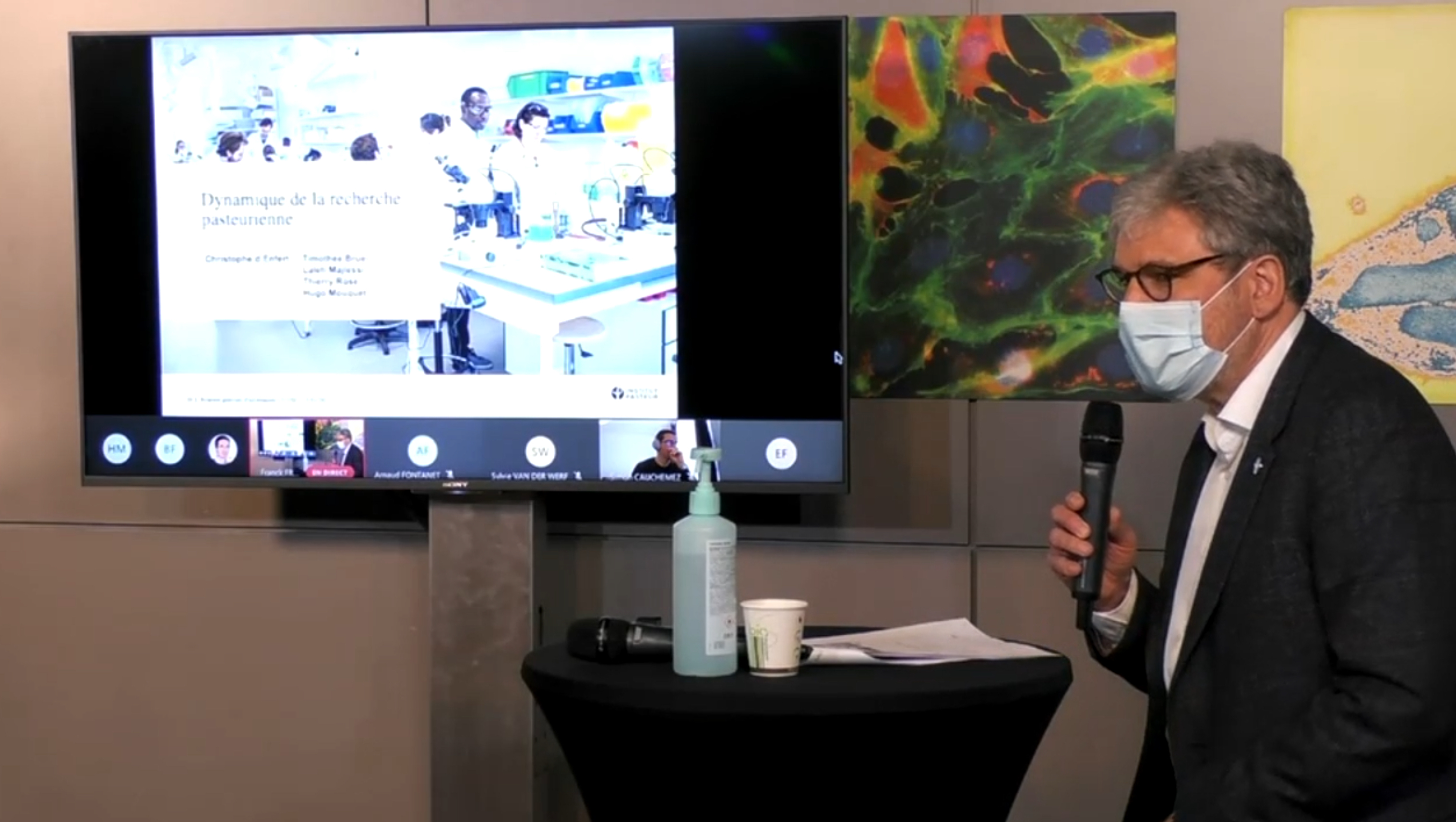 The second part of the meeting, moderated by Christophe D’Enfert, Scientific Director, focused on the dynamics of the Institut Pasteur's research. The aim was to provide a clearer idea of the scale of the Institut Pasteur's response to the pandemic by looking at four areas of action in particular. The first speaker in this section, Timothée Bruel, presented the results of a study on immunity to SARS-CoV-2 after infection or vaccination and used these findings to shed light on the efficacy of antibodies in tackling variants. Laleh Majlessishared the latest progress on the lentivirus platform for the development of a COVID-19 vaccine. Thierry Rose spoke on innovative diagnostic and serological approaches, especially serological assays to detect SARS-CoV-2-specific IgG antibodies using LuLISA technology. Finally, Hugo Mouquet outlined the findings of research on monoclonal antibodies for therapeutic purposes aimed at SARS-CoV-2. Around a hundred monoclonal antibodies are expected to have been developed by the end of May.
The second part of the meeting, moderated by Christophe D’Enfert, Scientific Director, focused on the dynamics of the Institut Pasteur's research. The aim was to provide a clearer idea of the scale of the Institut Pasteur's response to the pandemic by looking at four areas of action in particular. The first speaker in this section, Timothée Bruel, presented the results of a study on immunity to SARS-CoV-2 after infection or vaccination and used these findings to shed light on the efficacy of antibodies in tackling variants. Laleh Majlessishared the latest progress on the lentivirus platform for the development of a COVID-19 vaccine. Thierry Rose spoke on innovative diagnostic and serological approaches, especially serological assays to detect SARS-CoV-2-specific IgG antibodies using LuLISA technology. Finally, Hugo Mouquet outlined the findings of research on monoclonal antibodies for therapeutic purposes aimed at SARS-CoV-2. Around a hundred monoclonal antibodies are expected to have been developed by the end of May.
 The next part of the meeting looked at vaccination at the Institut Pasteur, with presentations by Paul-Henri Consigny, Director of the Institut Pasteur Medical Center, and Béata Francuz, Head of the Occupational Health Department. Since January 18, the Medical Center has been one of 20 COVID-19 vaccination centers in Paris, and the team's efforts have resulted in more than 5,800 vaccines being administered, at a rate of approximately 200 people each day. Paul-Henri Consigny also spoke about the next stages, which will see vaccination at the Medical Center scaled up in the month of April. Béata Francuz explained the internal logistics that have been put in place in the Occupational Health Department to vaccinate Institut Pasteur staff with the AstraZeneca vaccine (note that recent events have led to the temporary suspension of the administration of this vaccine).
The next part of the meeting looked at vaccination at the Institut Pasteur, with presentations by Paul-Henri Consigny, Director of the Institut Pasteur Medical Center, and Béata Francuz, Head of the Occupational Health Department. Since January 18, the Medical Center has been one of 20 COVID-19 vaccination centers in Paris, and the team's efforts have resulted in more than 5,800 vaccines being administered, at a rate of approximately 200 people each day. Paul-Henri Consigny also spoke about the next stages, which will see vaccination at the Medical Center scaled up in the month of April. Béata Francuz explained the internal logistics that have been put in place in the Occupational Health Department to vaccinate Institut Pasteur staff with the AstraZeneca vaccine (note that recent events have led to the temporary suspension of the administration of this vaccine).
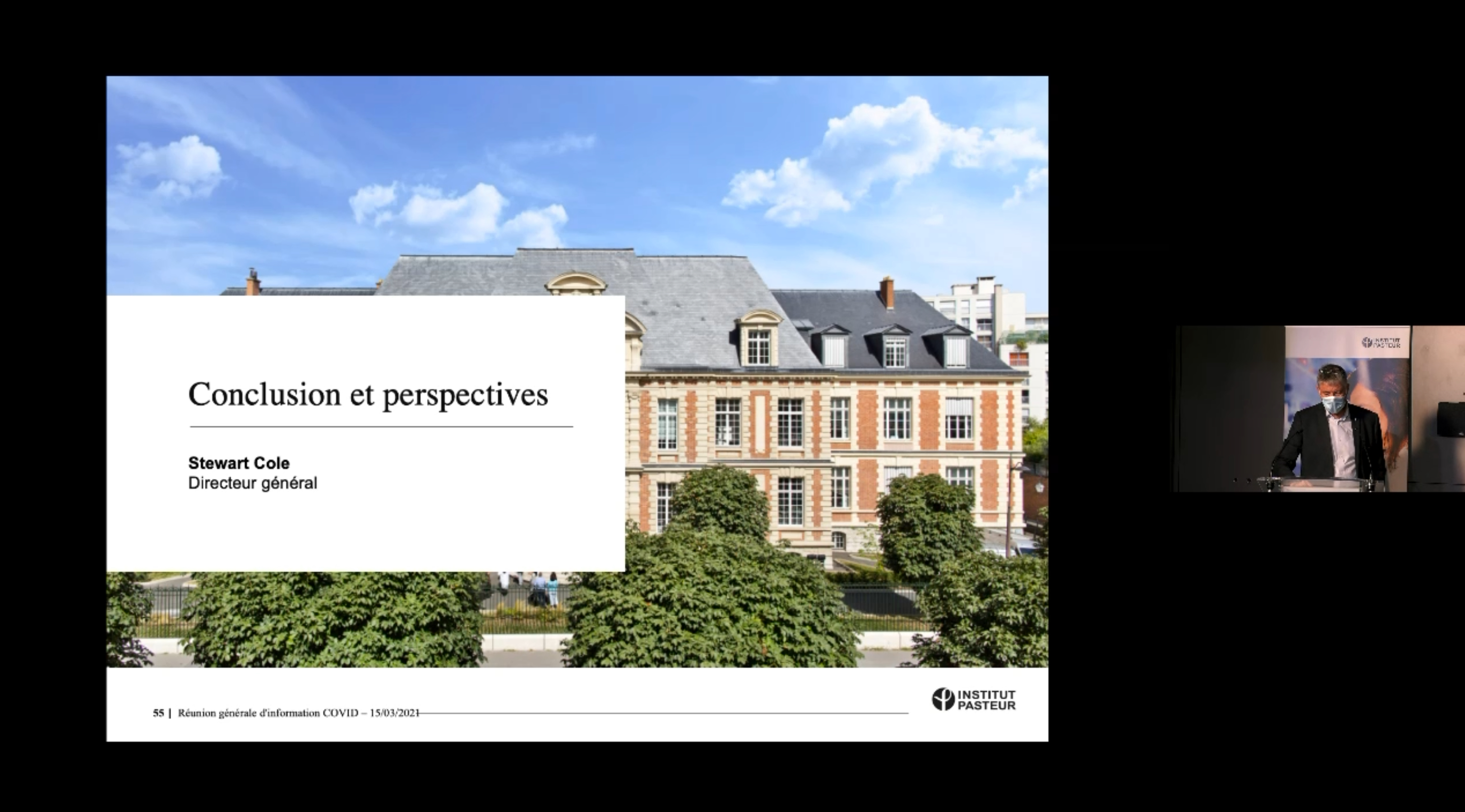 Stewart Cole, who in his introduction emphasized the unprecedented nature of the year 2020 in so many ways, not least for science at the Institut Pasteur, concluded with a general overview of the situation at the Institut Pasteur and its strategy for tackling the many challenges it faces. "We are at a key moment in the Institut Pasteur's history. France, and the world, are expecting us to carry out outstanding research that contributes to new knowledge, and also to make discoveries that lead to new products that improve the quality of life of our fellow citizens." Pointing to the need to accelerate innovation, boost translational research, support medicinal chemistry, develop the agility of vaccine research, "remedicalize" the Institut Pasteur and increase financial resources via the French Research Planning Act, the endowment fund and the new Philanthropy Department, Stewart Cole emphasized the "importance of consolidating our action, also at international level," while noting that "by remaining united and standing together, by adapting our efforts and generating innovation, the Institut Pasteur is definitely capable of addressing these challenges, and together we intend to do so."
Stewart Cole, who in his introduction emphasized the unprecedented nature of the year 2020 in so many ways, not least for science at the Institut Pasteur, concluded with a general overview of the situation at the Institut Pasteur and its strategy for tackling the many challenges it faces. "We are at a key moment in the Institut Pasteur's history. France, and the world, are expecting us to carry out outstanding research that contributes to new knowledge, and also to make discoveries that lead to new products that improve the quality of life of our fellow citizens." Pointing to the need to accelerate innovation, boost translational research, support medicinal chemistry, develop the agility of vaccine research, "remedicalize" the Institut Pasteur and increase financial resources via the French Research Planning Act, the endowment fund and the new Philanthropy Department, Stewart Cole emphasized the "importance of consolidating our action, also at international level," while noting that "by remaining united and standing together, by adapting our efforts and generating innovation, the Institut Pasteur is definitely capable of addressing these challenges, and together we intend to do so."
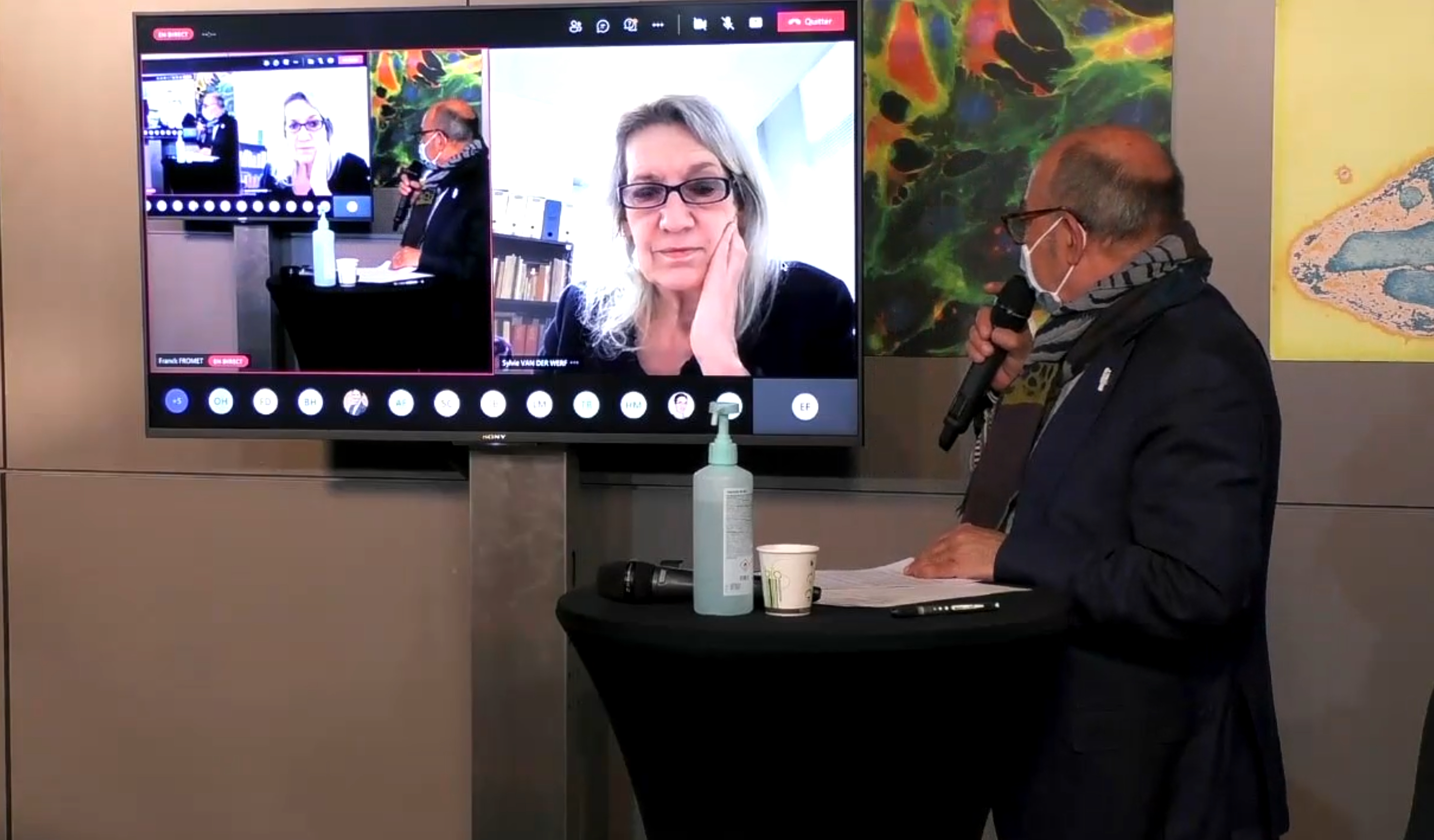 The meeting then moved on to a question and answer session, during which the speakers were able to go into more detail about their presentations. Nearly 50 questions were asked.
The meeting then moved on to a question and answer session, during which the speakers were able to go into more detail about their presentations. Nearly 50 questions were asked.
Watch the staff meeting
See the presentation
See Stewart Cole's opening address and conclusion
Documents and presentations for internal use only
A satisfaction survey was sent out after the meeting to gage your views. There is still time to complete the survey – you have until 5pm today to share your thoughts and help us prepare for future meetings.